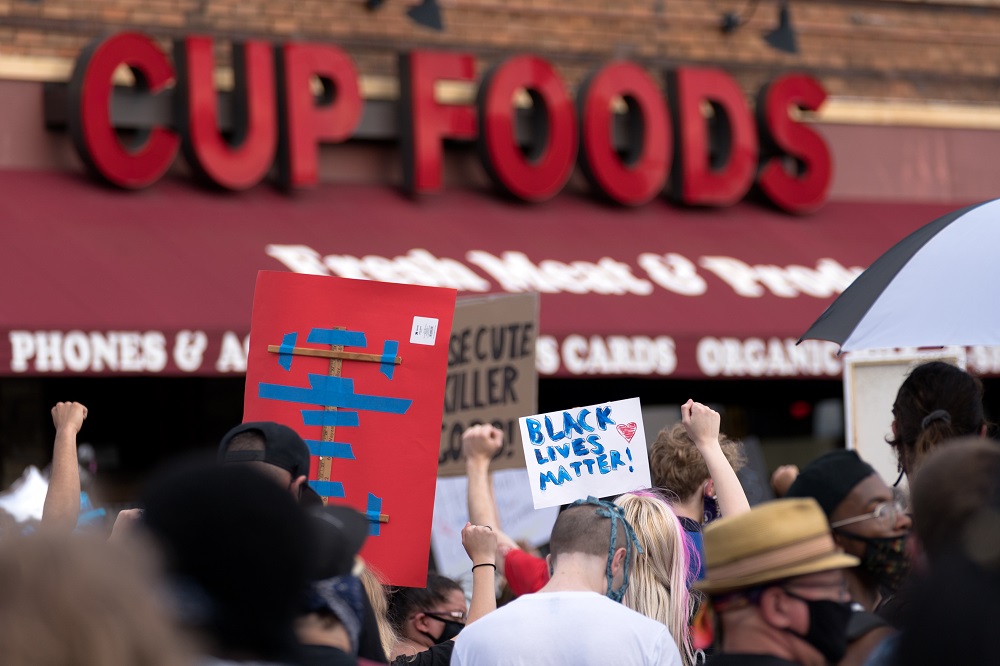Police discrimination isn’t just a problem in the USA – we need to tackle it in Wales too

Leena Sarah Farhat, Diversity officer for the Welsh Liberal Democrats
Police brutality is prominent in the news at the moment due to the death of 46-year-old George Floyd in Minnesota.
George Floyd died after a white police officer named Derek Chauvin kneeled on his neck for eight minutes and 46 seconds. Floyd begged for his life before falling unconscious and dying in the street, in full view of witnesses and a rolling mobile phone camera.
Four officers, including Chauvin, have been fired from the department for their involvement. Since then Minneapolis, and cities across the US, have seen riots, looting, arson and violence.
It’s easy for us to shake our heads and think of police discrimination against BAME people as a problem for the United States, and perhaps some urban areas in the UK such as London.
Unfortunately, Wales is no exception to this history of discrimination and has never been. We recently marked the 100th anniversary of the terrible 1919 race riots, which showed that Wales’ BAME community have always suffered much harsher treatment and sentences throughout its history.
But this is not just a historical problem to be atoned for. White and BAME people in Wales are treated unequally by the policy even today. A good example is Section 60 orders – better known as ‘stop and search’.
These powers were originally designed for the police to use when they had intelligence that rival gangs, originally rival football fans, were arranging to meet, armed, at a particular time and place. But today it is clearly being used far too widely and disproportionately against BAME people.
North Wales Police carried out 1.3x as many stop and searches of BAME people as white people. In the Dyfed Powys region, there were 1.7x as many stop and searches of BAME people as there were white people.
South Wales Police carried out 2.5x as many stop and searches of BAME people as there were white people. And in the Gwent region, there were 3.8x as many stop and searches of BAME people as there were White people. You can check out your own area with this tool.
Listening
So what can we do? Well, it’s clear that as a first step we need to abolish the much-misused Section 60. The police already have the power to stop and search people for weapons if they have reasonable suspicion – they don’t need this additional power.
We should instead be looking to restore community policing, so that officers can build links and trust with the communities they serve and gather the intelligence they need to identify weapon-carriers.
But as a wider rule, we as a society need to stop ignoring this problem and start listening to those that suffer as a result. These are not faraway issues that cease to exist when we look away or turn off social media.
A first step is to ask your elected representatives – Members of the Welsh and Westminster Parliaments – what they are doing to make the justice system more equal, as many are just not engaging with the issue.
In Wales, as in England, we also elect Police and Crime Commissioners (PCC) to hold our police to account. They are elected by us, and are often representatives of a political party (we have two from Plaid Cymru and two from Labour in Wales). And yet few people are aware of them and their work.
Ask them what they are doing to reduce discrimination within and by their police force. If you have a personal story or something you’ve witnessed, you could tell them about it. Think about your community and everyone in it when you head to the ballot box and hold people to account, because nowhere in Wales is the number of stop and searches of BAME people the same as that of white people.
If you don’t feel that you’re informed enough to take on this issue, read the Lammy Review – an independent review of the treatment of BAME individuals in the Criminal Justice System – for further guidance.
Some of the reforms we should be working towards include:
- Promoting representation within the police by boosting police recruitment from BAME groups.
- A full review of the causes of the overrepresentation of BAME individuals in the criminal justice system.
- Ensuring that all people are treated fairly, including monitoring how diverse communities are affected by policing priorities and methods
- Working to make sure that public services are sensitive to the needs of everybody. Nobody should be prevented from accessing key services because of their ethnicity or background.
Most BAME people will have a police-related story and Wales is no different. How can we tell people to trust the police when it is recorded that they are part of the institutional racism that we face as BAME people?
There is a failure within our forces to stamp out discrimination. This is not the open and tolerant Wales that we deserve, and we can do better.
Wales is not an equal country. That must change. You can help change it.
Support our Nation today
For the price of a cup of coffee a month you can help us create an independent, not-for-profit, national news service for the people of Wales, by the people of Wales.






